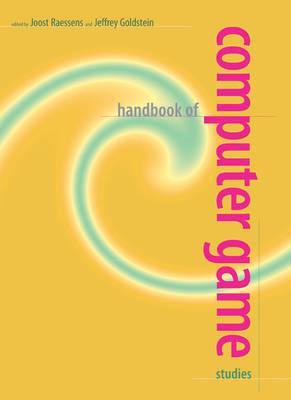Handbook of Computer Game Studies

Handbook of Computer Game Studies
New media students, teachers, and professionals have long needed a comprehensive scholarly treatment of digital games that deals with the history, design, reception, and aesthetics of games along with their social and cultural context. The Handbook of Computer Game Studies fills this need with a definitive look at the subject from a broad range of perspectives. Contributors come from cognitive science and artificial intelligence, developmental, social, and clinical psychology, history, film, theater, and literary studies, cultural studies, and philosophy as well as game design and development. The text includes both scholarly articles and journalism from such well-known voices as Douglas Rushkoff, Sherry Turkle, Henry Jenkins, Katie Salen, Eric Zimmerman, and others.
Part I considers the "prehistory" of computer games (including slot machines and pinball machines), the development of computer games themselves, and the future of mobile gaming. The chapters in part II describe game development from the designer's point of view, including the design of play elements, an analysis of screenwriting, and game-based learning. Part III reviews empirical research on the psychological effects of computer games, and includes a discussion of the use of computer games in clinical and educational settings. Part IV considers the aesthetics of games in comparison to film and literature, and part V discusses the effect of computer games on cultural identity, including gender and ethnicity. Finally, part VI looks at the relation of computer games to social behavior, considering, among other matters, the inadequacy of laboratory experiments linking games and aggression and the different modes of participation in computer game culture.
217.60Lei
217.60Lei
Indisponibil
Descrierea produsului
New media students, teachers, and professionals have long needed a comprehensive scholarly treatment of digital games that deals with the history, design, reception, and aesthetics of games along with their social and cultural context. The Handbook of Computer Game Studies fills this need with a definitive look at the subject from a broad range of perspectives. Contributors come from cognitive science and artificial intelligence, developmental, social, and clinical psychology, history, film, theater, and literary studies, cultural studies, and philosophy as well as game design and development. The text includes both scholarly articles and journalism from such well-known voices as Douglas Rushkoff, Sherry Turkle, Henry Jenkins, Katie Salen, Eric Zimmerman, and others.
Part I considers the "prehistory" of computer games (including slot machines and pinball machines), the development of computer games themselves, and the future of mobile gaming. The chapters in part II describe game development from the designer's point of view, including the design of play elements, an analysis of screenwriting, and game-based learning. Part III reviews empirical research on the psychological effects of computer games, and includes a discussion of the use of computer games in clinical and educational settings. Part IV considers the aesthetics of games in comparison to film and literature, and part V discusses the effect of computer games on cultural identity, including gender and ethnicity. Finally, part VI looks at the relation of computer games to social behavior, considering, among other matters, the inadequacy of laboratory experiments linking games and aggression and the different modes of participation in computer game culture.
Detaliile produsului










